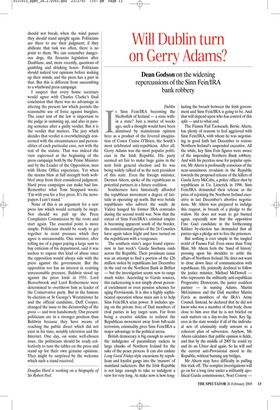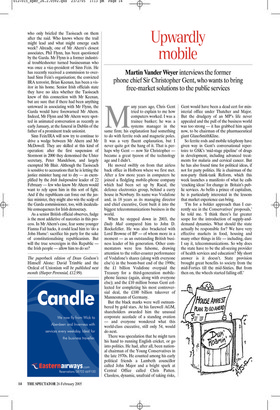Will Dublin turn on Gerry Adams?
Dean Godson on the widening repercussions of the Sinn Fein/IRA bank robbery
Dublin
Is Sinn Fein/IRA becoming the Hezbollah of Ireland — a state within a state? Just a matter of weeks ago, such a thought would have been dismissed by mainstream opinion here as a product of the fevered imagination of Conor Cruise O’Brien, the South’s most celebrated anti-republican. After all, Gerry Adams was the most popular politician in the Irish Republic. His party seemed set fair to make huge gains in the next Irish general election and he was being widely talked of as the next president of this state. Even the foreign minister, Dermot Ahern, spoke of the republicans as potential partners in a future coalition.
Southerners have historically afforded the republican movement a degree of latitude in operating up north. But woe betide republicans who subvert the south: de Valéra hanged his former IRA comrades during the second world war. Now that the extent of Sinn Fein/IRA’s criminal empire is becoming apparent south of the border, the constitutional parties of the 26 Counties have again taken fright and have turned on the republicans with a vengeance.
The southern state’s anger found expression in last week’s Garda Siochana raids across the Republic. Their proximate cause was an attempt to find a portion of the £26 million stolen by republicans last December in the raid on the Northern Bank in Belfast — but the investigation seems now to range much wider. According to Garda sources, this racketeering is not simply about personal enrichment or even pension schemes for aging Provisionals. It is also a highly sophisticated operation whose main aim is to help Sinn Fein/IRA seize power. It includes spying on the private lives of Dail members of rival parties in key target seats. Far from being a creative sideline to redirect the Republican movement away from full-scale terrorism, criminality gives Sinn Fein/IRA a major advantage in the political arena.
British democracy is big enough to survive the indulgence of paramilitary rackets in large chunks of Northern Ireland for the sake of the peace process. It can also endure Long Good Friday-style excursions by republican and loyalist gangs into the ‘manors’ of mainland racketeers. But the Irish Republic is not large enough to take so indulgent a view for very long. At stake now is how long lasting the breach between the Irish government and Sinn Fein/IRA is going to be. And that will depend upon who has control of this split — and to what end.
The Fianna Fail Taoiseach, Bertie Ahern, has plenty of reasons to feel aggrieved with Sinn Fein/IRA, with whom he was negotiating in good faith last December to restore Northern Ireland’s suspended executive. All the while, key Sinn Fein figures were aware of the impending Northern Bank robbery. And with his peerless nose for popular opinion, Mr Ahern is profoundly conscious of the near-unanimous revulsion in the Republic towards the proposed release of the killers of Garda Jerry McCabe, a police officer shot by republicans in Co. Limerick in 1996. Sinn Fein/IRA demanded their release as the price of rejoining the Northern Ireland executive in last December’s abortive negotiations. Mr Ahern was prepared to indulge this request, in breach of a pledge to the widow. He does not want to get burned again, especially now that the opposition Fine Gael candidate in the forthcoming Kildare by-election has demanded that all parties sign a pledge not to free the prisoners.
But nothing is ever simple in the tangled world of Fianna Fail. Even more than Tony Blair, Mr Ahern feels the ‘hand of history’ pressing upon his shoulder to settle the affairs of Northern Ireland. He does not want to close down lines of communication with republicans. He pointedly declined to follow the justice minister, Michael McDowell who represents the militantly anti-republican Progressive Democrats, the junior coalition partner — in naming Adams, Martin McGuinness and the Dail member Martin Ferris as members of the IRA’s Army Council. Instead, he declared that he did not know who was a member of that body; those close to him aver that he is not briefed on such matters on a day-to-day basis. Key figures in the state wonder if all of the individual acts of criminality really amount to a coherent plan of subversion. Anyhow, Mr Ahern calculates that public opinion is fickle, and that by the middle of 2005 he could try and do an Ulster deal again. So he will surf the current anti-Provisional mood in the Republic, without burning any bridges.
Mr Ahern may have difficulty in pulling this trick off. The complex investigations will go on for a long time under a militantly apolitical Garda commissioner, Noel Conroy — who only briefed the Taoiseach on them after the raid. Who knows where the trail might lead and what might emerge each week? Already, one of Mr Ahern’s closest associates, Phil Flynn, has been questioned by the Garda. Mr Flynn is a former industrial troubleshooter turned businessman who was once a vice-president of Sinn Fein. He has recently received a commission to overhaul Sinn Fein’s organisation; the convicted IRA terrorist, Brian Keenan, has been a visitor in his home. Senior Irish officials state they have no idea whether the Taoiseach knew of this connection with Mr Keenan, but are sure that if there had been anything untoward in associating with Mr Flynn, the Garda would have forewarned Mr Ahern. Indeed, Mr Flynn and Mr Ahern were spotted in animated conversation as recently as early January, at the funeral in Dublin of the father of a prominent trade unionist.
Sinn Fein/IRA will now try to continue to drive a wedge between Mr Ahern and Mr McDowell. They are skilled at this kind of operation: after the first suspension of Stormont in 2000 they demonised the Ulster secretary, Peter Mandelson, and largely exempted Mr Blair. Although the Taoiseach is sensitive to accusations that he is letting the justice minister hang out to dry — as exemplified by the Irish Independent leader of 22 February — few who know Mr Ahern would want to rely upon him in this sort of fight. And if the republicans can force out the justice minister, they might also win the scalp of the Garda commissioner, too, with incalculable consequences for Irish democracy.
As a senior British official observes, fudge is the most addictive of narcotics in this process. In Mr Ahern’s case, fear some younger Fianna Fail hacks, it could lead him to ‘do a John Hume’: sacrifice his party for the sake of constitutionalising republicanism. But will the true sovereigns in this Republic the Irish people — allow him to do so?

















































 Previous page
Previous page